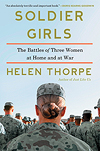
Solider Girls: The Battles of Three Women at Home and at War, by Helen Thorpe, Scribner, New York, 2014, $28
How war changes men has been the subject of countless books through the ages. How war changes women is the compelling subject of Soldier Girls, a vivid and intensely personal account of the lives of three women whose only common denominator had been that they joined the Indiana National Guard never imagining they might end up in a war zone. Journalist Helen Thorpe, through access to their diaries, emails and Facebook pages—as well as extensive interviews—relates their experiences from 2000 to 2013 as their lives became intertwined in Afghanistan, and how they continued to depend on one another after returning home to a world that felt vastly different than the one they had left.
While the initial chapters lag a bit and linger too long on relationships, the minutiae later serves to fill out the portraits of the women once they enter the down-and-dirty life on a base in Afghanistan. With the skill of a novelist Thorpe tells us how they came to know one another, their drinking, drug and sex habits, the sexism rampant in some battalions, acceptance in others, and how the women ultimately won the respect of male colleagues.
Two of the women served double deployments, also spending a year in Iraq. One of them was driving a supply truck when a roadside bomb exploded beneath it and scrambled her brain. She would never be the same again.
As Thorpe notes, the Pentagon reported that more than 300,000 soldiers came back from Afghanistan and Iraq with invisible head wounds. Their body armor and the armor on their vehicles kept them alive, but “many of the soldiers had been knocked around so badly, their brains had sheared inside their skulls.” Thorpe’s matter-of-fact tone and clear and concise prose make the book all the more riveting.
But it is the chapters about the women’s return to civilian life that are the most engrossing: In one passage one of the women breaks down in a Target simply looking at the dozen different kinds of toilet paper, which now seem so superfluous and wasteful. And it was back in the States that their bonds, formed in a war zone, became the fragile glue that helped them move forward when they felt they were coming apart.
Providing an unexpected take on the active-duty soldier’s experience, Soldier Girls is a captivating read, an important book and a stunning accomplishment.
—Lorraine Dusky




